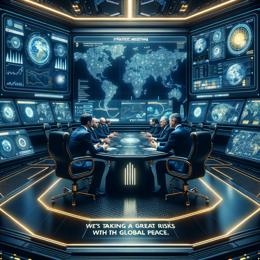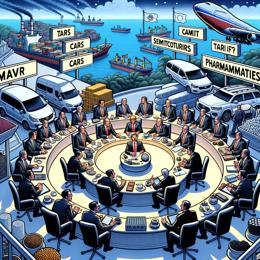Image created by AI
ANC Advocates for Increased Donation Limits in South African Political Funding
The African National Congress (ANC), South Africa's ruling party, has recently made a strong push for amending the current political funding laws, specifically targeting an increase in the R15 million cap on individual donations. During last week’s public hearings, various political entities, electoral overseers, and advocacy groups came together to discuss this contentious issue, highlighting the financial complexities of running a national political party.
The hearings, orchestrated by the Home Affairs committee of the National Assembly, focused on whether the existing financial thresholds for political donations stand sufficient in the contemporary political landscape of South Africa. The current framework, which includes a R15 million annual limit on donations from a single entity or individual and a R100,000 threshold for obligatory disclosure of donations, is under scrutiny.
Fébé Potgieter-Gqubule, the ANC’s head of policy, argued that the existing cap does not align with the financial demands of operating a party with an expansive network and presence across every ward in the nation. She noted, "The cost implications of political activities, especially with more ballots and a consequent need for increased voter education, are substantial." According to Potgieter-Gqubule, these expenses far exceed what was envisioned when the original limits were set.
However, the proposal has encountered significant pushback from transparency advocates, like My Vote Counts. They express concerns that increasing the donation limit could undermine the political independence of parties, potentially making them susceptible to influence by wealthy donors. This scenario, they argue, could jeopardize the democratic fabric of political engagement in South Africa, giving undue power to affluent individuals or entities.
Sy Mamabolo, from the Electoral Commission of South Africa (IEC), acknowledged these concerns during the hearings, emphasizing that any modification to the current laws would need extensive deliberation in the National Assembly. The discussions are crucial as they set the precedent for managing the delicate balance between adequate funding for political activities and maintaining robust democratic principles that prevent undue influence over political entities.
The debate comes at a critical time for the ANC, which has been grappling with financial difficulties amid broader political and economic challenges. An increase in the donation threshold could provide some respite for the party's operational demands but also raises questions about the broader implications for political equity and transparency in South Africa.
As this discussion progresses, it becomes evident that the intricacies of political funding are a mirror to the broader challenges faced in maintaining a resilient, transparent, and fair democratic system. The outcome of these discussions could redefine the landscape of political financing in South Africa, setting new norms for how political entities are supported and how they account to the public.










